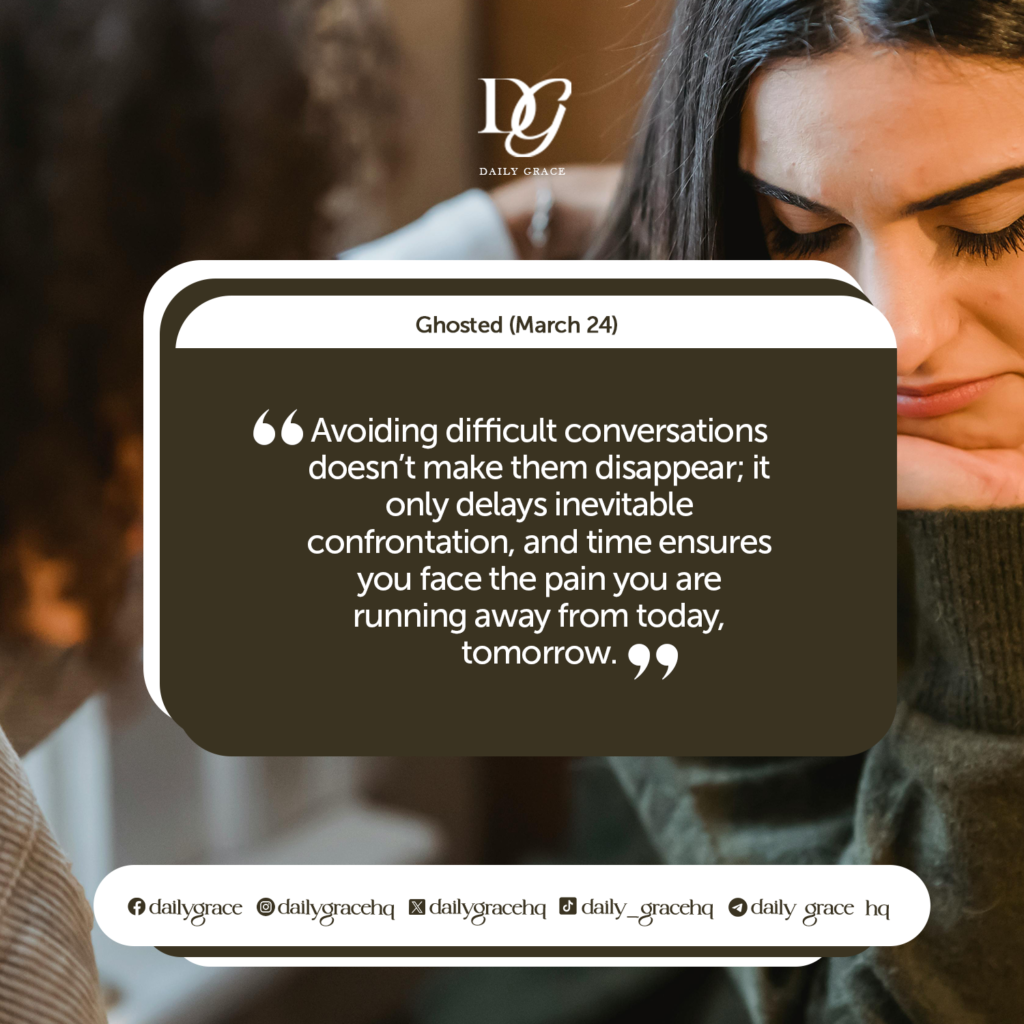Inspiring Change Every Day with Grace
Ghosted

A few months ago, I had the privilege to mediate an issue that involved two lovers, who for the first time were having a real disagreement. Instead of resolving the issue, the guy was rather avoiding the conflict, and it bothered the lady so much.
According to the guy, he’d learnt from his mom, to step away whenever he was confronted with a situation which was so overwhelming, so he did. He muted her calls, archived their chats, and disappeared behind the comfort of his silence.
At first, the lady believed he needed time. Maybe he was processing things. Maybe he would come back with an apology or, at the very least, an explanation. But as hours turned into days, her hope curdled into resentment and the ‘maybes’ turned into a reality she was faced with.
She wasn’t just left with unanswered messages; she was left questioning whether she had imagined their entire connection. How could someone who claimed to care about her erase her so easily?
The guy was avoiding reality, but his desire for an escape was drowning the lady in confusion. Her mind was filling in the blanks with worst-case scenarios. She wondered if he had pushed him too hard. Or if she had never been enough?
Meanwhile, this confusion could have been prevented simply with the right resolution method. Avoidance is never the solution, it does not resolve tension; it deepens it. It turns the tension into an emotional ghost that lingers far beyond the moment of disconnection.
Different people have different forms of avoidance. Some people ghost and they do that for fear of confrontation. Others block to regain a sense of control. Whereas others give the silent treatment as a passive-aggressive way to punish someone without direct conflict.
But beneath it all lies one core issue, emotional discomfort. When people haven’t developed the tools to express their feelings, they default to disappearance. They don’t realise that in the long run, avoidance doesn’t shield them it isolates them.
For those on the receiving end, the damage is profound. Studies show that social rejection activates the same brain regions as physical pain. That’s why being ignored doesn’t just hurt emotionally. It feels like an actual wound. And unlike an argument, which at least offers a form of emotional closure, ghosting leaves a void where answers should be.
It forces the abandoned party into an involuntary grieving process for a relationship that technically still exists but only in their memory.
But what do you do when faced with avoidance? Chasing someone who has already chosen distance only deepens the wound. Instead, the real challenge is acceptance. Not because it makes the pain any less real, but because it redirects your energy toward healing rather than seeking validation from someone unwilling to give it.
The closure you seek must come from within; the understanding that their avoidance is a reflection of them, not you.
For those who tend to withdraw, the question is this: What are you so afraid of confronting? Love requires courage, not just in moments of joy but in times of discomfort. Running doesn’t erase the hard conversations, it only postpones them.
And the irony? The longer you avoid it, the heavier the weight becomes. Emotional growth demands a willingness to sit in discomfort, to speak even when words feel messy and to stay when leaving feels easier.
No Copyright infringement intended.
Have you ever had someone you love suddenly shut you out? How did you handle it, and did you ever get an explanation?
Use the this link to share your story and experience anonymously https://gdpd.xyz/dailygrace
PS: Kindly Follow our WhatsApp Channel at https://whatsapp.com/channel/0029VawUlQGBPzjQXzs6fX2Q for more engaging content.


I believe avoiding a situation shouldn’t exceed a certain period of time.
This way it’s gives the couple a chance to resolve certain conflicts. For instance, if I know my partner is one that easily gets angry, I’ll give her time to calm down, that way also choosing ways to resolve the conflict and ensuring a better communication technique to avoid any kind of drama.
‘Love requires courage, not just in moments of joy but in times of discomfort. Running doesn’t erase the hard conversations, it only postpones them.’
This is so true, that is why exes end up talking about what brought a hault to their relationship after months or years of meeting again.
Meanwhile they could have talked it through when they were together.